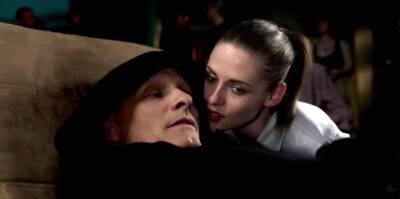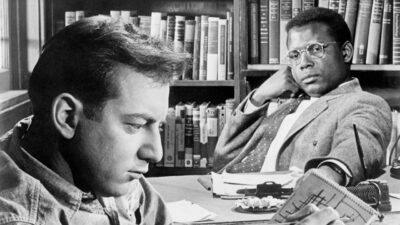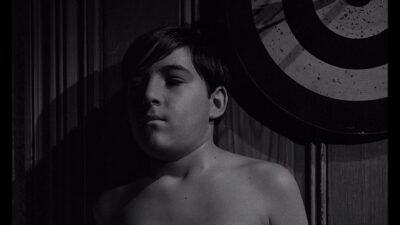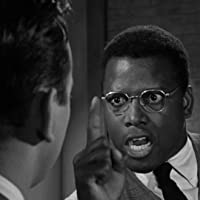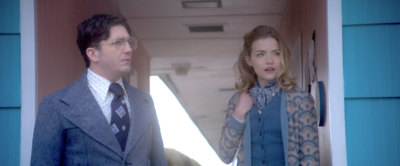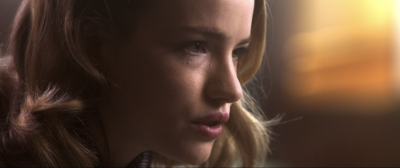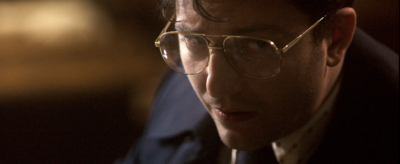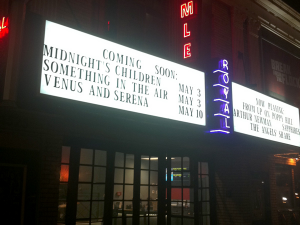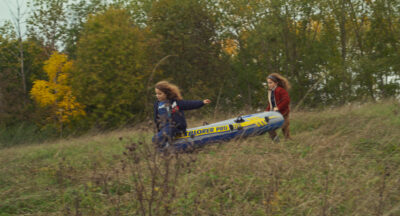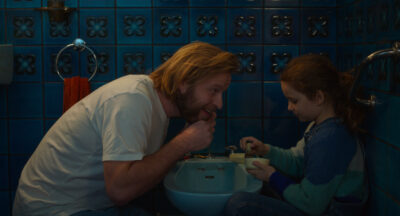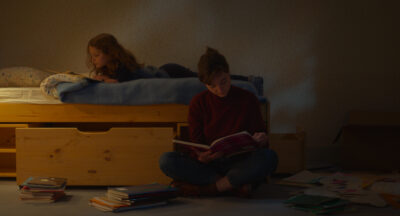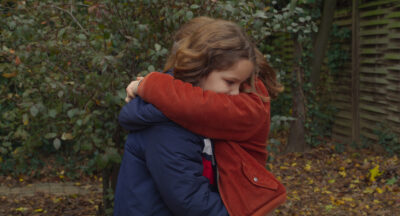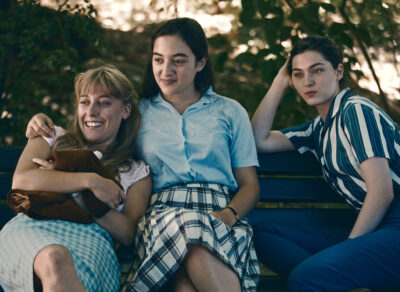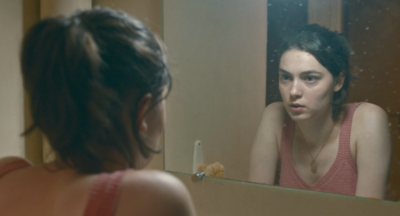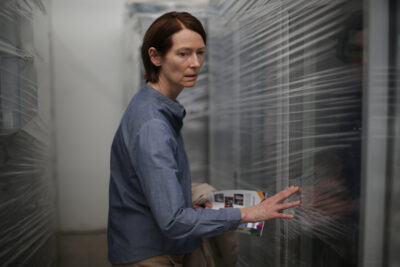Winner of seven César Awards — Best Film, Adapted Screenplay, Supporting Actor, Male Newcomer, Cinematography, Costume and Set Design — the sumptuous adaptation of Balzac’s LOST ILLUSIONS follows aspiring poet Lucien de Rubempré as he joins a cynical team of journalists in 19th century Paris and discovers that the written word can be an instrument of both beauty and deceit. Director/co-screenwriter Xavier Giannoli sat for an interview to discuss the movie we’ll open June 10 at the Claremont, Royal, Playhouse and Town Center.
Q: How did you decide to adapt LOST ILLUSIONS for the cinema?
A: I discovered the novel when I was in my twenties, about the same age as Rubempré. I was studying literature and I was fortunate to have a professor named Philippe Berthier, who has since become a great specialist in The Human Comedy [the multi-volume novel of which Lost Illusions is one part]. I had gone to the Sorbonne to be in the neighborhood with its many movie theaters. I didn’t yet know how, but I wanted to devote my life to cinema. Everything led back to it, in one way or another…
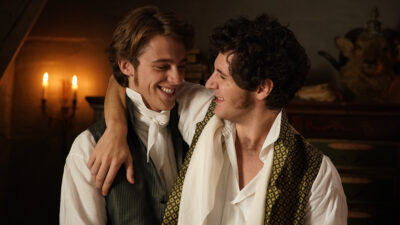
I then began to accumulate notes, visual references, studies by Marxist critics or their opposites, the reactionary aesthetes, because critics of all varieties wanted to reclaim Balzac. And as far back as I can remember, I have always lived with the idea of one day making a film adaptation of Illusions. But it was out of the question for me to color the novel’s images, to clumsily plagiarize the story in an academic adaptation. Art feeds on what it burns. Cinema is by nature the transfiguration of a reality or of a book – otherwise what is the point?
Q: What were your choices for this adaptation?
A: After years of exploring the book and its history, I needed to free myself from it, to concentrate on the sensations and feelings the text inspired in me, similar, in a way, to what music can inspire. In fact, it was by listening to a lot of music that I felt the novel become cinema. It was music that brought me back to what we look for beyond words in the work of cinema, especially when it is a literary adaptation.
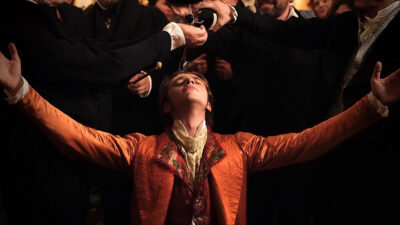
Some pieces of music were randomly chosen according to my tastes. I found this an original way to approach the work of adaptation. For example, there is the piece by Vivaldi, L’inquiétudine, that opens the film. It is 18th century baroque music re-orchestrated in a “romantic” style by Karajan. Different eras thus discover a secret harmony, like ours with that of Balzac. Max Richter went even further by freely “rewriting” Vivaldi’s Four Seasons, as if to express its spirit and modernity without betraying the work… I was also listening to Bach’s concerto for four pianos and orchestra, its incredible “choral” architecture where the themes seem to dialogue from one piano to another. I was thinking of all the characters, of the harmony that had to be found in the adaptation to tie together all these life lines, all these voices, all these tones, the tragic and the comic.
That is how the “movement” was established, the very physical sensation of movement, whether musical or simply that of bodies in the salons, throughout Paris, but also the great movement of a civilization in full mutation. This speed and movement had to be expressed, to be made a part of the setting.
Finally, in a more concrete way, I chose to concentrate on the second part of the novel: Un Grand homme de Province à Paris, the Odyssey of the young provincial who is going to discover “the back side of the scenery” and of consciences in the monstrous city.
Jacques Fieschi’s contribution to the script was very important in helping me to capture the film. He brought a sensitive approach to the characters, helped me to humanize their relationships when Balzac seemed too mocking and punitive.
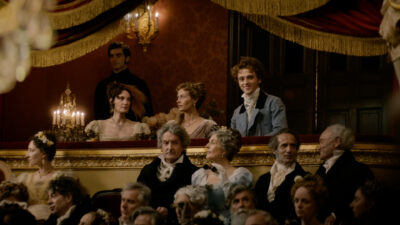
Q: The character of d’Arthez does not appear in the film…
A: In the novel, d’Arthez is in some way the moral counterpoint of Lousteau. He is a moody, pure young writer who embodies virtue, hard work, patience, and high moral standards. A kind of secular saint who belongs to the Cenacle group, an association of young men who, to put it simply, refuse to compromise themselves by making a pact with the world as it moves towards the race for profit and impatient recognition.
In the novel, Rubempré is torn between Lousteau and d’Arthez, between vice and virtue, but I found this dramatic casting too easy in a film, too didactic. Also, filming simple virtue bored me… While d’Arthez is, in a certain way, Rubempré’s bad conscience when he allows himself to be corrupted, I preferred that this rupture be an internal one, so that Rubempré can have an awareness, even if shrouded in illusions, of what he has renounced.
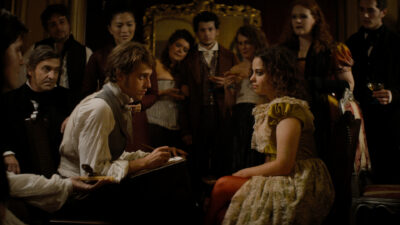
The spirit of d’Arthez thus flows differently in the film. Several characters see Lucien falling apart and tell him so, warn him… but he ruins himself in spite of everything… Out of revenge, greed, convenience, unawareness, innocence, survival instinct, pleasure… All these “notes” are present in his score and form the theme: the young man caught up in this movement of the world where all the values that structured society until then are shuffled like playing cards, laid out on a table where everyone cheats.
But the important thing for me was not to adopt a moralizing or punitive view of this story. Balzac is both fascinated and frightened by this new society that is paving the way for economic liberalism. He presents himself as a worried humanist rather than a moralizer.
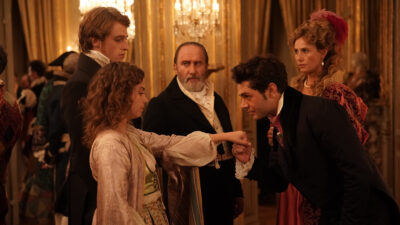
Q: What is this moment in history in which the novel takes place, in the first half of the 19th century?
A: There is a book by Philippe Muray which has a title I like very much: The 19th Century through the Ages. He often evokes Balzac and compares this moment of our history with “our time.” Some similarities are indeed disturbing…
After the blood of the Revolution and the wars of the Empire, French society is longing for a kind of peace, to enjoy it, to have fun… Louis XVIII is in power and he is looking for compromises. The aristocracy has restored the values of the monarchy but the new bourgeois society aspires to social, political and, especially, economic conquests. Louis XVIII is thus a King who is resolutely conservative but, at the same time, is unable to ignore the progress underway.
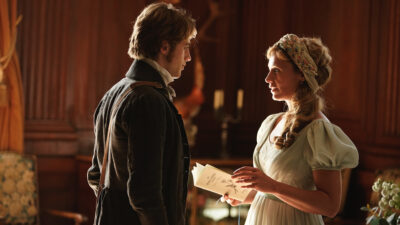
There was the France “underneath”, the one below the ramparts of Angoulême, and the nobles “above,” up on the hill. It is no accident that Rastignac (in Le père Goriot) and Rubempré both come from this provincial town, whose topography expresses this social divide that both these ambitious young men will want to cross, each in his own way.
But Paris is not about being there but being part of it. The Parisian aristocracy of money was also self-absorbed, jealous of its privileges. To find one’s place, it is necessary to accept the new “rules” imposed by the obsession with profit, even if it means giving up one’s values. “What have they done with us?” Louise will ask Lucien at the end of the film. I am fascinated by the title of a little-known novel by Balzac: Les comédiens sans le savoir [The Unwitting Comedians]. As if, in this society of performance, we have no other choice than to play this comedy, even in spite of ourselves.
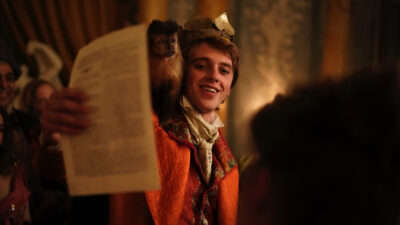
Coming from Angoulême full of illusions, Lucien will learn the hard way about these false pretenses and waste something of his beautiful aspirations. I am particularly touched by this theme of lost innocence, of the “waste of self,” of what was beautiful and precious in oneself. The insidious way that an era or an environment has of leading you to deny your ideals, your most beautiful “values.” Thus, the young idealistic poet of Angoulême will end up in Paris writing advertisements whereas he wanted to create something. He has fallen into the trap of “everything, right away”… and Lousteau, too, will admit: “And yet, I was good… I too had a pure heart.” Balzac saw all these young talents wasting themselves, getting lost in the smoke and mirrors.
Following the example of the little Corsican who became emperor of the world, these young people dreamed of conquests, of social revenge, but this time far from the battlefields. Heroism becomes careerist, monetizable. It is even at this time that the first business school was created!
But be careful: Lucien is not a victim. That would be too easy. Balzac also sees the fascinating seduction of this “new world.” Cruelty and melancholy are two notes that I wanted to make resound in the din of the whirlwind.
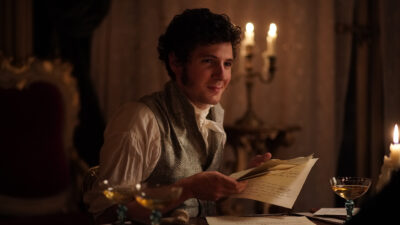
Q: Exactly what is this world that Balzac sees being born before his eyes?
A: During the period when Balzac was writing Illusions, Marx was in the streets of Paris and Thackeray was preparing Barry Lyndon, which would be published in serial form a little later. There are dozens of other examples of authors who understood that the world had entered “the icy waters of selfish calculation,” to use a phrase dear to Marxists. The critic Georg Lukacs has written magnificent pages on this great novel of the “capitalization of minds” and the “commodification of the world.”
Balzac sees this moment when “being” degenerates into “possessing” and “possessing” degenerates into “appearing” because he is also writing about France’s conversion to capitalism, and the human, political, spiritual and artistic damage caused by this earthquake.
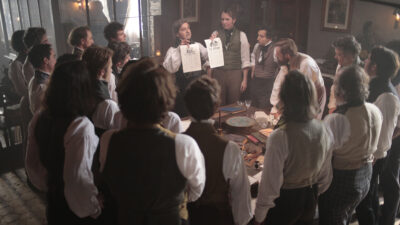
Q: So, with the fundamental value becoming that of profit, can we still know what really has “value” in this world of Illusions, what really has “meaning”?
A: I’m thinking of those books that the publisher Dauriat will not even read. Or the novel by young Nathan, about which Rubempré admits, following his paid “lesson in criticism”, that he no longer knows if he finds it “good or bad”. Or those plays that are booed or applauded by hired claqueurs [a group of people employed to boo or applaud in French theatres].
A fundamental issue is raised here: that of the possibility of meaning in the modern world. What still has meaning in a world where everything is evaluated by a market value? The young poet Rubempré will be hunted down and the young actress sacrificed by the hounds as though in a pagan ritual. Does art still have a place in such a world? And I found it particularly interesting that these questions were captured in a movement of cinema, the machine of illusions par excellence, the spectacle of life… and of death.
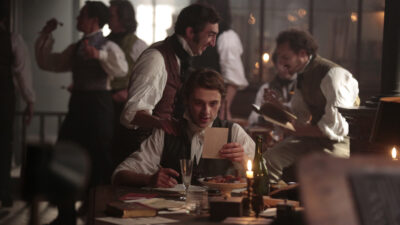
Q: The novel is very severe with the journalism of the time.
A: The commercial press is only a sign, in The Human Comedy, of society’s great movement towards the God of profit. An entire civilization is being swept away, not a simple corporation. Balzac is severe with these small newspapers that resembled lawless “gangs,” ready to exchange their opinion for money.
I wanted to film these so-called journalists as gangsters who shoot up careers, defend their territory in theaters and fight with inkwells. For me, wickedness, cruelty and bad faith are as much cinematic material as violence.
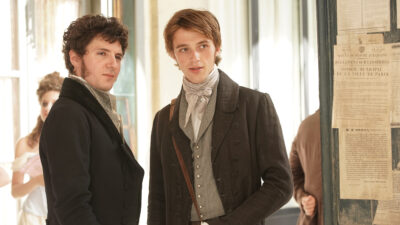
But from the moment the press became “commercial,” it was foreseeable that some would respond to imperatives other than the desire to enlighten the reader. A little later, Randolph Hearst will declare, “False information and a denial are already two events!”
Besides, at a time when the print media is in the midst of a “crisis,” I liked filming inks, paper, lead typefaces, books, carved quills, newspaper sheets… all the “signs” of the civilization of the written word now threatened by “numbers,” calculation, and the digital.
And it is indeed the cinema, this impure art so dependent on money, which now has to consider this tumult that Balzac saw come alive before his eyes.
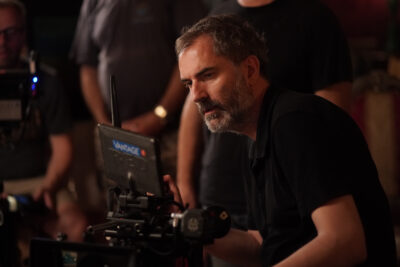
Q: How did you work on recreating Restoration Paris?
A: I fought to shoot in France, in Paris, and in “real” settings, as much as possible. The project was also a way to pay tribute to the splendor of France, its spirit, its language, as well as its fabrics and its spaces. All of that is the same expression of a magnificent civilization, need I remind you?
My set designer Riton Dupire-Clément, my costume designer Pierre-Jean Laroque, my director of photography, the brilliant Christophe Beaucarne, or my sound engineer François Musy, all were concentrated on restoring a feeling of the period as precise and as sensual as possible. I enjoyed immersing myself in the world of 19th century Paris, discovering the fantastic forgotten theater of the Château de Compiègne where Coralie is stoned at the end of the film. With its perspectives, you would think it was designed by Kubrick…
I shot with very special lenses that subtly distort the perspectives, sometimes darkening the edges of the screen. I was looking for both a feeling of “realism” through the precision of the reconstruction but also a shift, a poetic and sometimes “fantastic” vision, as in the backstage of theaters, the vision of Lucien’s staring eye discovering the back of the set.
I was especially looking for sensuality, an organic relationship with the places and the materials, with the colors, for all that to be embodied, to become cinema, life, sound, movement… A cinematic spectacle in a world where a whole society becomes a spectacle, a game of shadows and illusions, but where the body, physical love and violence remain “real”.
Balzac is both sensualist and philosopher, psychologist and anthropologist, painter and director. For example, when reading the description of the Boulevard du Crime, you get the feeling that he had the intuition of cinematic language, it is clear. It is a literature of the gaze. Cinema is organically linked to Balzac’s vision of the world. Eisenstein spoke about it in his lessons on directing based on “Le Père Goriot.”
Q: Tell us about the casting, Lucien and the others…
A: Benjamin emerged as a natural, physical choice. It is the injustice of the “gift,” of the cinematic body, of the look that the camera likes. I did long screen tests in costume where he recited poems, laughed, cried. He had an innocence without mawkishness, a sensuality without vulgarity, a period diction without effort. An element of cinema in which the smallest gesture has a grace without calculation. He was Rubempré, a modern Rubempré. Everything was personified… Just look at his assurance in front of Depardieu. It’s the same thing. It’s animal.
Cécile came to the fore when I decided to humanize the character of Louise, who in the novel has the same first name as Darrieux in Madame De… by Max Ophuls, about whom I often thought. In Balzac’s work, there is something miserable and pathetic about her, ready to do anything to be accepted by high society. I wanted her renunciation of Lucien to have a more sensitive and “tragic” quality, so that the social aspect did not totally destroy the feelings. I wanted to nuance, to make their relationship and their age difference more complex and moving. The cruelty of their relationship seemed more devastating to me if their relationship remained secretly loving.
I invented the scene where the young Coralie visits Louise to ask her for help… and not to “take” Lucien from her. Salomé Dewaels is for me a great discovery, even though we had already seen her in small roles. She has this full body, with a roundness that looks “period”, and at the same time the innocence and the craftiness of a girl from the street. She herself was a night bartender and she amazed me when she recited verses from Berenice in the screen tests with perfect diction. She “speaks” dialogues that are sometimes taken from the book, although written in the language of the 19th century. I found the discussion scenes with Lucien when they are in bed, after making love, particularly moving, for their youth, their spontaneity, their sensual innocence. I thought about the cruelty of their fate, the unjust sacrifice of a young woman by a cynical society.
If he had been more clever, more Rastignac, Lucien would have seduced the terrible Madame d’Espard, played by the dazzling Jeanne Balibar, whose every sibilant line in the dialogue, every look, becomes a danger both voluptuous and threatening. Perhaps she is also taking revenge for the fact that Lucien does nothing to seduce her and that it is even more unbearable for her than seeing a young commoner trying to penetrate the aristocracy. Again, the cruelty of the situations, of the social struggle, seemed to me even more bloody and physical when mixed with wounds of love.
“And yet I was good…” This sentence had caught me while reading the novel. It haunted me… and Vincent Lacoste gives it a glow that is both painful and laughing, a derision that masks a failure, a renounced vocation, a lost illusion. Lacoste gives a human truth to each look and his incredible laughter resounds at the bottom of an abyss, of a life perhaps already ruined… He is funny and tragic in the same movement, that of jealousy and friendly betrayal. Once again, I wanted to give the character a chance because his humanity rips away a little more of his flesh.
Friendship as a value torn to shreds by “the hounds” is an essential theme of the film, one of those higher feelings put to the test by the obsession with success and profit. And while Lousteau sells out, Nathan resists and “plays with it all,” as he wants to push Lucien to learn to do in order to protect his talent.
For this character, I wanted an artist, an icon. A musician, a writer… or why not a filmmaker. I quickly thought of Xavier Dolan whom I admire as a filmmaker and as an actor. He has a very pure energy and an uncommon intelligence. He was enthusiastic when he read the script and immediately understood the issues at stake, starting with the place of the artist in this world, the vanity and the taste for beauty, against all odds… Our relationship was close and concentrated, right up to the enormous voice work of the narrator, who enlightens the film with his irony and his humanity.
He is an accomplished actor, subtle and unpredictable, extraordinarily involved. In the film, he is an icon of his time who, unlike Lucien or Lousteau, knows how to protect his inspiration from the social and “media” comedy. Crossing paths with him on this gigantic shoot was very stimulating for me, like a visceral reminder of the need for a personal vision, for a singular proposal.
On the set, I had real joy in seeing him working so closely with Depardieu. Something of the poetic history of cinema was there, between the actor of Loulou and the author of Mommy. Depardieu was jubilant in playing this fruit and vegetable vendor who cannot read but has become the sultan of publishers, through pure commercialism. He is an actor of pure genius – you could see it in the looks that all these young actors were giving him. Seeing him so happy to act, to invent, gave us incredible energy.
Finally, I would like to say a word about the great Jean-François Stévenin, my claqueur, whose presence on the set was essential to remind me that a film must remain an adventure, that one must not let oneself be fooled by the system, to risk everything and expect nothing, and to protect one’s flame, however modest it may be. His death overwhelms me.
He would have been the first to pay tribute to André Marcon and Louis-Do de Lencquesaing and to all those who embody this bundle of destinies, this “Human Comedy.”

